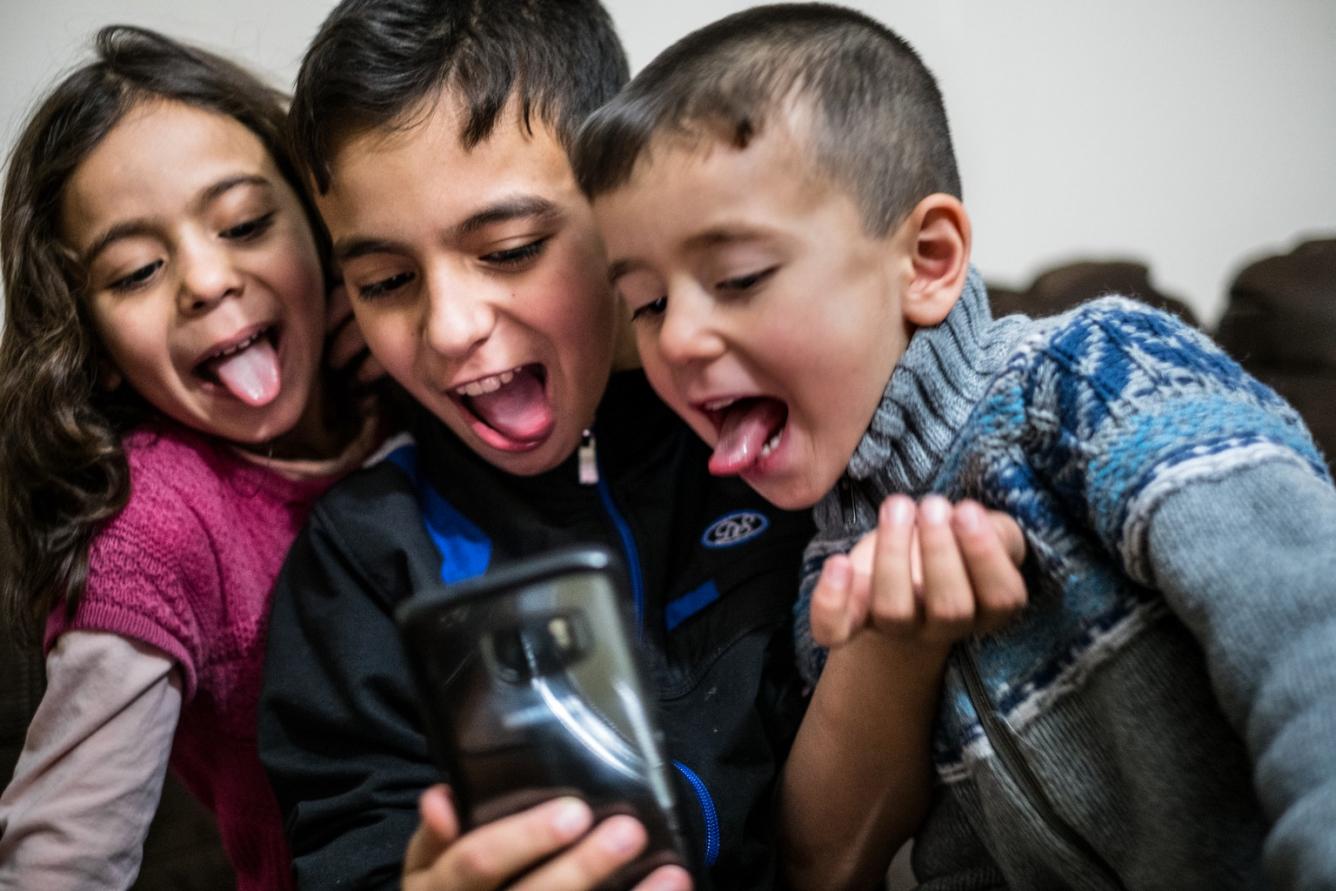Basel Alrashdan, 11, and his family were the first Syrian family to be resettled on Canada’s Prince Edward Island.
Nearly 50 million children worldwide have been uprooted — more than half of them by violence and conflict. The brutal Syrian conflict has forced over 2.2 million children to flee to neighbouring countries and beyond. The Canadian Government, which welcomes 300,000 immigrants every year — nearly one percent of its population — has resettled over 25,000 Syrian refugees nationwide.
Basel Alrashdan (left), playing in the snow with other sixth graders at St. Jean Elementary School, came to Charlottetown on Prince Edward Island (P.E.I.) with his family on 27 December 2015. The Alrashdans were the first Syrian family to be resettled on the Island.
In Basel’s class alone, seven languages are spoken among 16 of the students, and half of the children at his school are refugees or migrants. Basel (light blue coat) waits for the school bus with other Syrian and Congolese refugee children. His sister and brother also go to his school.
Canada has embraced a policy of multiculturalism. The Alrashdans are among 250 Syrian refugees who have been resettled on P.E.I. Basel (here with Tom Hilton from the P.E.I. Human Rights Commission) prepares to give a speech at the Human Rights Day celebration in Stratford Town.
Canadian leaders and communities are working to create a ‘mosaic’ in which cultures remain distinct and can coexist in a society that celebrates differences and diversity. Basel (foreground) and other participants sample some of the different foods offered at the community event.
Basel, taping another achievement certificate to his bedroom wall, has received recognition from both his community and school.
"We call him ‘the Little Mayor’,” the principal at his school said. “He’s very dedicated to what’s fair and just. That was evident with him from the get go.”
All three children are integrating well. (Left-right) Shatha, 7, Basil, and Idress, 5, relax at home with their father.
“Refugees’ rights in Jordan were less than other people’s,” says Mr. Alrashdan, who worked two jobs — from 6 a.m. until midnight every day — to support his family.”
In Canada, their family of five receives $1,957 each month to cover their expenses (which include rent and petrol, in addition to food). Mr. Alrashdan shops in a small Middle-Eastern supermarket in their community.
The Alrashdans also frequent a local farmer’s market in their adopted hometown. (Facing camera, left-right) Mr. Alrashdan (black coat), Basel (blue coat) and Idress (red coat) chat and mingle with Canadians and other Syrian refugees in the community during a visit to the market.
Back from shopping, the couple and their children unload their car.
We lost everything we had in Syria. Two houses, an apartment, a car…” Mr. Alrashdan says. “… a good life,” Mrs. Alrashdan adds, finishing her husband’s thought.
The family sits down to a traditional Middle-Eastern meal in their home.
“We lost it all,” Mrs. Aldrashan continues. “And now we will try to do our best in Canada.” “They gave us everything we need and didn’t ask us for anything,” her husband adds.
The couple uses the smart phone they own to set up appointments. With it they can also access information on services and support available, and on events taking place in their community. They pay for internet service out of the money they receive monthly.
The children, too, enjoy having a smart phone and being able to connect on line. (Left-right) Shatha, Basel and Idress ‘morph’ funny faces they make and selfies they take using the phone’s camera and a downloaded app.
It has been nearly a year since the Alrashdans came to P.E.I.
“It was really fast and very sad,” Basel says, recalling what his father told him as the family fled their homeland during heavy fighting. “Just take your very important things and put them in a small bag and come with us.”
Basel, who was afraid to go to Canada at first, now considers himself Canadian-Syrian and is proud to be in the country.
“Please remember to stand up for someone’s rights — today, tomorrow and forever,” he said, speaking at the Human Rights Day celebration in Stratford. “Thank you.”
To help UNICEF provide life-saving assistance to more children affected by the Syrian crisis, click here.














